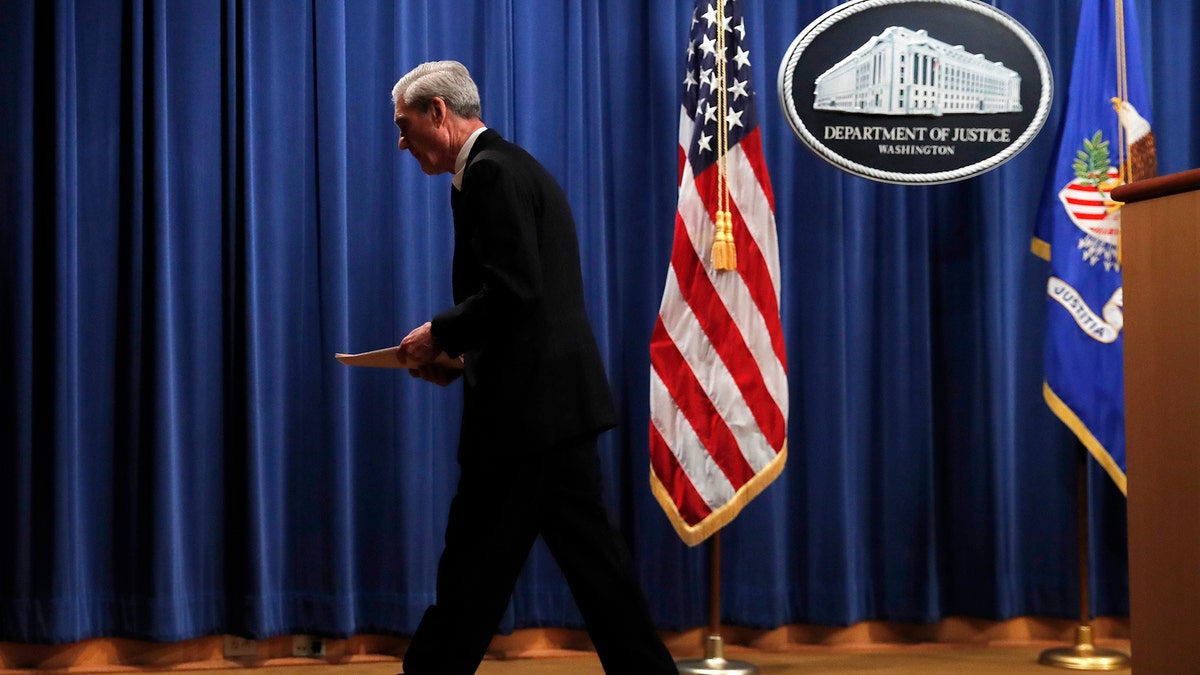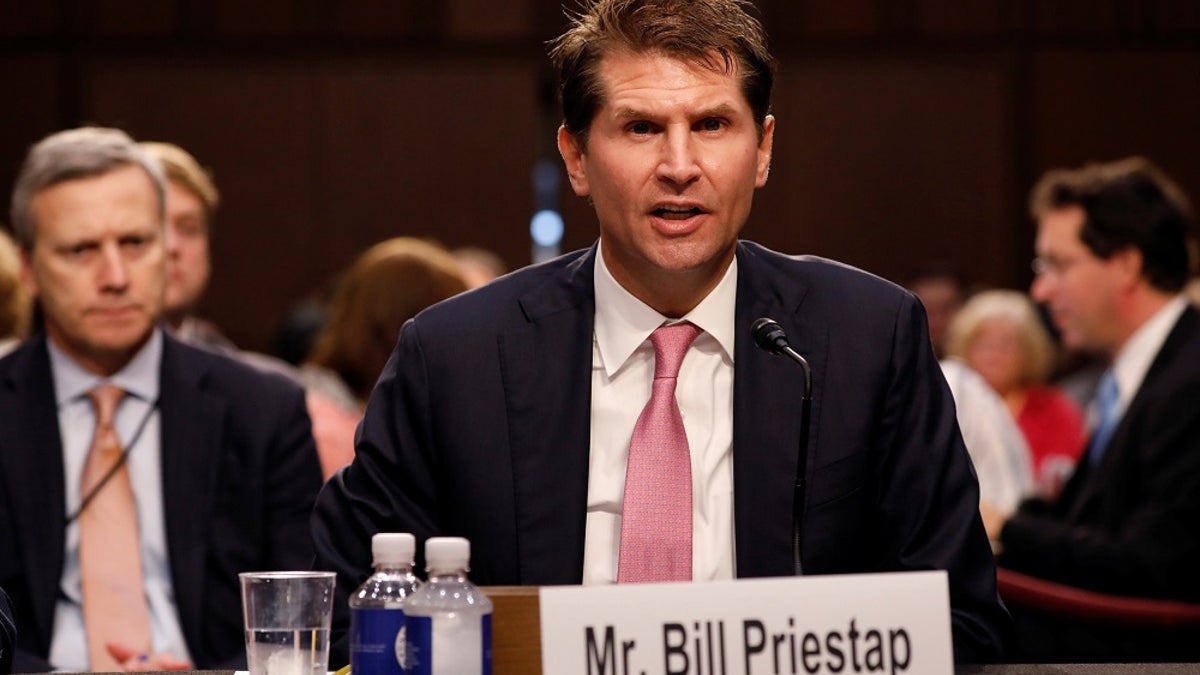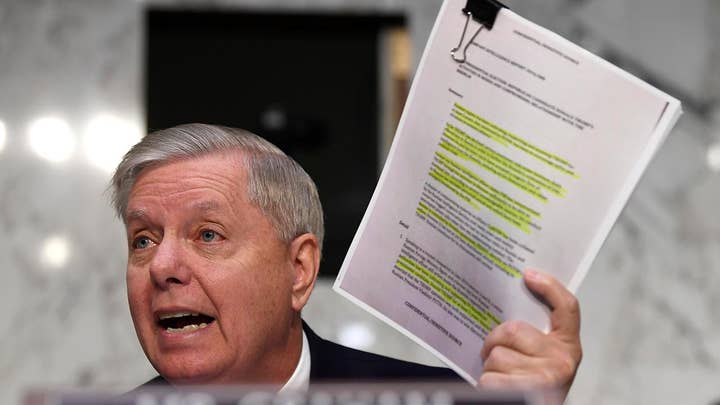Flynn files fallout: Impact of revelations on Michael Flynn's case
Fallout continues from recently released FBI documents in the Michael Flynn case; reaction from John Yoo, former deputy assistant attorney general, and Harry Litman, former U.S. attorney.
Explosive, newly unsealed evidence documenting the FBI's efforts to target national security adviser Michael Flynn -- including a top official's handwritten memo debating whether the FBI's "goal" was "to get him to lie, so we can prosecute him or get him fired" -- calls into question whether Brandon Van Grack, a Justice Department prosecutor and former member of Special Counsel Robert Mueller's Team, complied with a court order to produce favorable evidence to Flynn.
Since February 2018, Van Grack has been obligated to comply with D.C. District Court Judge Emmet G. Sullivan's standing order in the Flynn case to produce all evidence in the government’s possession “that is favorable to defendant and material either to defendant’s guilt or punishment.”
The order also requires the government to submit favorable defense evidence to the court, including possible "impeachment evidence" that could undermine witnesses, even if the government believes the evidence “not to be material.”
WHO IS JOE PIENTKA, MYSTERY FBI AGENT AT CENTER OF FLYNN AND CARTER PAGE CASES? ... FBI SCRUBS HIM FROM WEBSITE
Van Grack has long informed Sullivan that the government’s so-called "Brady" obligations, referring to prosecutors' duty to turn over exculpatory materials to defendants, have been met. In an October 2019 filing, Van Grack denied governmental misconduct and assured the court that the government “has complied, and will continue to comply, with its discovery and disclosure obligations, including those imposed pursuant to Brady and the Court’s Standing Order.”
In that same October 2019 motion, Van Grack elaborated on those claims, telling Sullivan that the government had not “affirmatively suppressed evidence” or hid Brady material. He denied that government was “aware of any information that would be favorable and material to [Flynn] at sentencing.”
Van Grack further dismissed arguments by Flynn's attorney, Sidney Powell, that “General Flynn was targeted and taken out of the Trump administration for concocted and political purposes” as “conspiracy theories.”

Special counsel Robert Mueller walks from the podium after speaking at the Department of Justice Wednesday, May 29, 2019, in Washington, about the Russia investigation. (AP Photo/Carolyn Kaster)
DOJ regulations state that prosecutors like Van Grack, "with limited exceptions ... should be granted access [by FBI agents] to the substantive case file and any other file or document" that they "have reason to believe may contain discoverable information related to the matter being prosecuted." The regulations state that prosecutors can "personally review the file or documents or may choose to request production of potentially discoverable materials from the case agents."
What Van Grack didn’t inform the court about – and didn’t provide to Flynn – was the newly unsealed January 4, 2017 "Closing Communication" from the FBI Washington Field Office, which recommended the FBI close its investigation of Flynn, as its exhaustive search through government databases “did not yield any information on which to predicate further investigative efforts."
Van Grack also failed to provide evidence to Flynn’s attorneys that anti-Trump former FBI agent Peter Strzok then immediately intervened and instructed the FBI case manager handling the Flynn investigation to keep the probe open, followed by indicators that the bureau would seek to investigate Flynn for possible violations of an obscure 18th century law known as the Logan Act -- which has never been utilized in a modern prosecution.
Another Strzok text mentions that the FBI’s "7th floor" – meaning FBI leadership – may have been involved in the decision to keep the Flynn case alive.
Instead, Van Grack characterized Flynn’s alleged false statements as critical to the FBI’s “legitimate and significant investigation into whether individuals associated with the campaign of then-candidate Donald J. Trump were coordinating with the Russian government in its activities to interfere with the 2016 presidential election.”
HOROWITZ REPORT MAY INADVERTENTLY REVEAL PIENTKA'S ROLE IN PAGE, FLYNN MATTERS
He argued to Sullivan that Flynn’s “conduct and communications with Russia went to the heart of that inquiry.” And Van Grack said that Flynn’s alleged “false statements to the FBI on January 24, 2017, were absolutely material.”
But by that time, the FBI had already cleared Flynn of any improper ties, coordination, or communication with Russia. Just a day before Flynn's January 2017 White House interview, the Washington Post ran a story declaring that the FBI "had reviewed Flynn’s calls with Russian ambassador but found nothing illicit," citing unnamed "U.S. officials."
Shedding light on internal FBI deliberations, notes from the then-assistant director of the FBI’s Counterintelligence Division Bill Priestap -- written before the Flynn interview and after discussions with then-FBI Director James Comey and then-FBI Deputy Director Andrew McCabe, Fox News is told -- show discussions of whether their “goal” at the White House interview was “to get him to lie, so we can prosecute him or get him fired.”

In this July 26, 2017 photo, Bill Priestap, assistant director of the FBI's Counterintelligence Division, testifies during a Judiciary Committee hearing into alleged collusion between Russian and the Trump campaign. (Reuters)
These unsealed notes further suggest that agents planned in the alternative to get Flynn “to admit to breaking the Logan Act” when he spoke to then-Russian Ambassador Sergey Kislyak during the presidential transition period.
The Logan Act has never been used in a modern criminal prosecution and has a questionable constitutional status; it was enacted in 1799 in an era before telephones and was intended to prevent individuals from falsely claiming to represent the United States government abroad.
"Any criminal investigation grounded in Logan Act questions is an obvious political pretext to attack the Trump Administration," GOP Reps. Jim Jordan and Mike Johnson wrote to FBI Director Christopher Wray on Monday, in a letter seeking in-person interviews and key documents. "FBI attorney Lisa Page admitted to Congress the Justice Department saw the Logan Act as an 'untested' and 'very, very old' statute."
READ JORDAN AND JOHNSON'S LETTER TO THE FBI
This new evidence puts Van Grack at risk for accusations that he was misleading Sullivan as to the materiality of Flynn’s statements to FBI agents Strzok and Joe Pientka when they interviewed him in the White House on January 24, 2017.
Jordan and Johnson are now specifically seeking to question Pientka, who participated in the January 2017 White House interview that led to Flynn's prosecution.
Fox News has previously determined that Pientka was also intimately involved in the probe of former Trump aide Carter Page, which the DOJ has since acknowledged was riddled with fundamental errors and premised on a discredited dossier that the bureau was told could be part of a Russian disinformation campaign.
Pientka was conspicuously removed from the FBI's website after Fox News contacted the FBI about his extensive role in Crossfire Hurricane Foreign Intelligence Surveillance Act (FISA) matters -- a change first noticed by Twitter user Techno Fog -- but sources say Pientka remains in a senior role at the agency's San Francisco field office.
BOMBSHELL FBI MATERIALS REVEAL FBI DISCUSSED INTERVIEWING FLYNN TO GET HIM TO LIE, GET HIM FIRED
The FBI, speaking to Fox News last December, asserted that reporting on Pientka's identity would potentially endanger his life and would serve no legitimate journalistic purpose. Republicans have previously sought to question Pientka, however, beginning in 2018. On Monday, the FBI declined to provide any additional comment.
For an individual to be prosecuted for a false statement offense under federal law, the lie must be “material.” The newly revealed materials strongly suggest the FBI wasn’t truly concerned about Flynn’s call with Kislyak during the presidential transition period. If the questioning of Flynn by Strzok and Pientka were based on a pretext, that revelation would arguably defeat any assertion that Flynn’s purported lies were material.
Other reports of edited information and a secret agreement may put the issues surrounding the compliance with Sullivan’s standing order into context.
FBI HAD INDICATORS THAT STEELE DOSSIER WAS RUSSIAN DISINFORMATION OPERATION
For example, the Mueller Report omitted key parts of a voicemail from Trump lawyer John Dowd to Flynn’s former lawyers discussing a joint defense agreement and the exchange of information.
Additionally, the release of emails from Flynn’s former attorneys at Covington & Burling revealed the existence of “a lawyers unofficial understanding that they are unlikely to charge [Michael Flynn Jr.] in light of the [Flynn’s] Cooperation Agreement.”
Per Flynn's former lawyers, this served to "limit" what the government "have to disclose" to any defendant against whom Flynn would have to testify.
That arrangement is contrary to the stated terms of the November 30, 2017 plea offer signed by Van Grack, Flynn, and his lawyers, which represents that there were no other “agreements, promises, or understandings” between the special counsel’s office and Flynn.
Andrew McCarthy, a former federal prosecutor and Fox News contributor, has noted: “[F]ederal law requires all terms of a plea agreement to be disclosed to the court; prosecutors are not at liberty to obscure plea terms because they are embarrassed or tactically harmed by having agreed to them.”
The dispute over the government’s compliance with Sullivan’s standing order may bolster Flynn’s efforts to withdraw his plea or, ultimately, have the case dismissed due to government misconduct. Flynn, who has said more recently that he did not lie to the FBI, pleaded guilty in late 2017 as mounting legal fees pushed him to sell his home.
Prosecutors have suggested Flynn's guilty plea allowed him to escape liability for a possible charge under the Foreign Agents Registration Act (FARA), another little-known and once-rarely used law, for his alleged work in Turkey.
Powell has stated that she expects more evidence to be produced soon, and has implied the FBI doesn't even have any proof Flynn discussed the Obama administration's sanctions with Russia's ambassador. "No lawyer for @GenFlynn has heard the recording or seen the transcript [of Flynn's intercepted calls with the ambassador]," Powell wrote on Twitter on Sunday. "I bet $1000 there is no mention of 'sanctions.'"
During the White House interview, Flynn told the agents "not really" when asked if he had sought to convince Kislyak not to escalate a brewing fight with the U.S. over sanctions imposed by the Obama administration, according to a FD-302 witness report prepared by the FBI that has been disputed by Flynn's defense team. Flynn also reportedly demurred when asked if he had asked Russia to veto a U.N. Security Council resolution that condemned Israel’s settlements in the West Bank, the FBI claimed. (The Obama administration abstained in that vote.)
According to the FBI's 302, Flynn issued other apparently equivocal responses to FBI agents' questions, and at various points suggested that such conversations might have happened or that he could not recall them if they did. Flynn's team has indicated he was concerned that the agents interviewing him, including Strzok and the lower-level Pientka, may have lacked the necessary security clearance to discuss sensitive foreign policy matters.
Meanwhile, Van Grack’s name has been absent from the government’s latest court filings and they have yet to respond to Flynn’s latest motion to dismiss.
After this article was published, the FBI provided a statement to Fox News saying that under Wray, the bureau had turned over relevant Flynn materials to the U.S. attorney probing possible FBI criminal misconduct during the Trump probe, John Durham -- but the FBI didn't say when exactly the handoff happened.
“Under Director Wray’s leadership, the FBI has fully cooperated and been transparent with the review being conducted by U.S. Attorney Jeff Jensen, just as it has been with U.S. Attorney John Durham and was with Inspector General Michael Horowitz," the statement read.
The FBI continued: "With regard to certain documents in the Michael Flynn matter from the 2016-2017 time period that are now the subject of reporting by the press, the FBI previously produced those materials to the Inspector General and U.S. Attorney Durham. The Flynn investigation was initiated and conducted during this time period, under prior FBI leadership. Since taking office, Director Wray has stressed the importance of strictly abiding by established processes, without exception. Director Wray remains firmly committed to addressing the failures under prior FBI leadership while maintaining the foundational principles of rigor, objectivity, accountability, and ownership in fulfilling the Bureau’s mission to protect the American people and defend the Constitution.”
Late Tuesday, the DOJ told Flynn's team that it was turning over even more potentially exculpatory evidence that was "obtained and analyzed by USA EDMO [Eastern District of Missouri] in March, April and May 2020." The precise nature of those materials was not immediately clear -- nor was it apparent why prosecutors in the Eastern District of Missouri were finally turning over the documents now.
The previously released exculpatory materials discussed in this article, the DOJ has said, were obtained by EDMO in March and April.
Fox News' David Spunt and Wilson Miller contributed to this report.















































